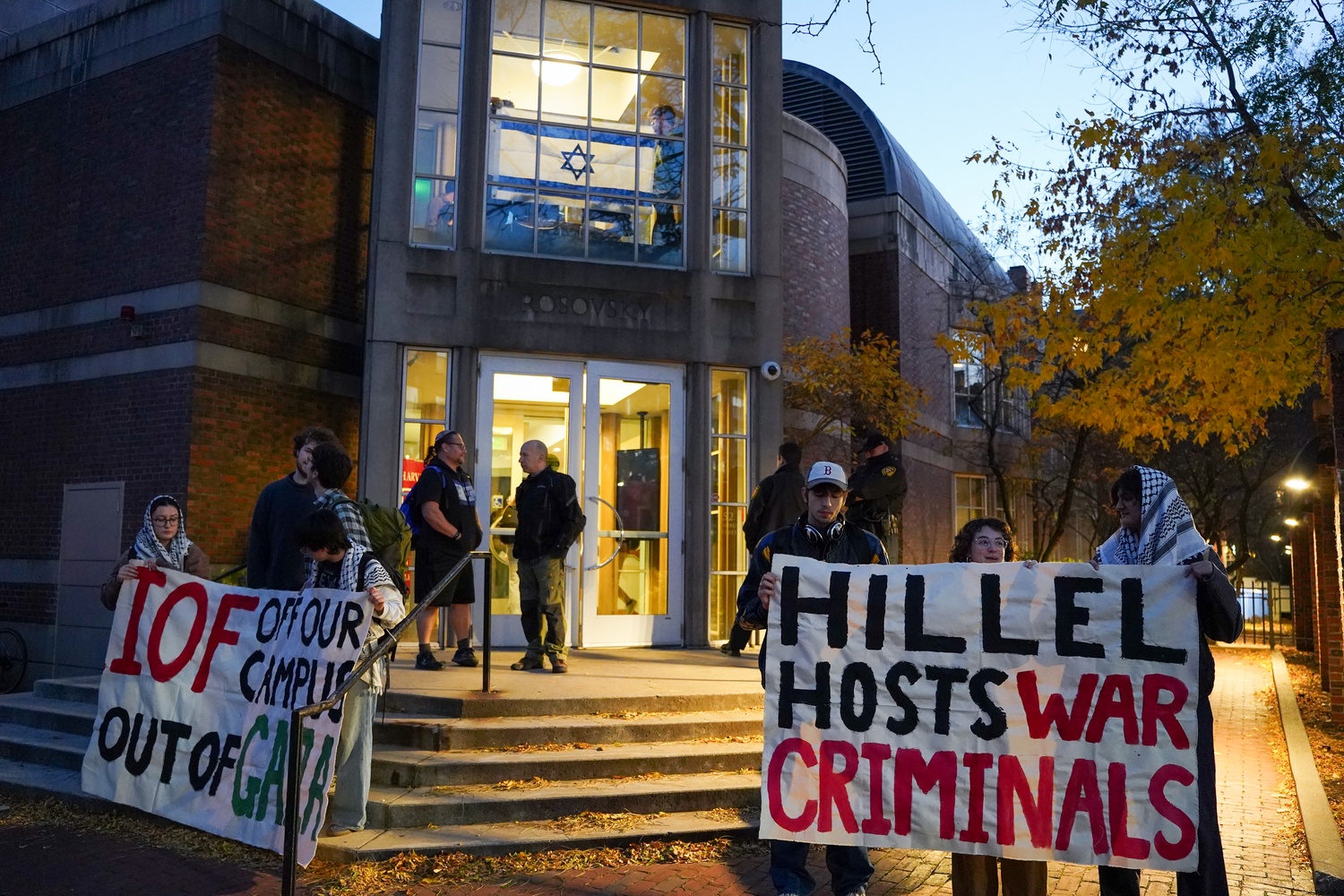
News
Summers Will Not Finish Semester of Teaching as Harvard Investigates Epstein Ties

News
Harvard College Students Report Favoring Divestment from Israel in HUA Survey

News
‘He Should Resign’: Harvard Undergrads Take Hard Line Against Summers Over Epstein Scandal

News
Harvard To Launch New Investigation Into Epstein’s Ties to Summers, Other University Affiliates

News
Harvard Students To Vote on Divestment From Israel in Inaugural HUA Election Survey
Why I Protest Hillel
On Monday, Harvard Hillel saw its first protest in years, organized by the very Jewish students it claims to represent.
We protested Hillel for its decision to host Ronen Manelis, a former chief spokesperson of the Israeli military. Manelis oversaw intelligence operations in Gaza during “Operation Protective Edge,” when Israel martyred over 2,000 Palestinians. During the Great March of Return, a largely nonviolent protest in Gaza, Manelis wrote that “there can be no such thing as a peaceful protest in Gaza, only gatherings organized, sanctioned and funded by Hamas.”
This week’s protest was not an anomaly but another chapter in a much longer tale of Jewish discontent with Hillel. In the past year alone, Hillel has faced criticism from students, faculty members, and even one of its former Executive Directors. It has criticized other Jewish organizations, suspending its own chapter of J Street and campaigning against Jews for Palestine on the ironic claim that we Jews are “endangering Jews.”
By platforming Manelis and his violent rhetoric, Hillel has made abundantly clear what many of us already knew to be true: Hillel is an arm for Zionism — a political ideology — before it is a home for all Jews at Harvard.
The organization’s unwavering commitment to Zionism is apparent everywhere one looks, from the Israeli flag which hangs in its dining hall to the annual trip it subsidizes and sends to Israel. Hillel is, in its Executive Director’s own words, the “home of Zionism” at Harvard.
But Zionism is not Judaism, and Hillel’s supreme embrace of Zionism comes at a price. With its insistence upon peddling a politics above representing a people, Hillel has undermined its self-proclaimed title — and arguably only essential role — as the “hub for Jewish life” at Harvard.
While, on paper, Zionism is the (since-realized) nationalist movement for a Jewish state in the land of Palestine, in reality, it is inextricable from the displacement of Palestinian people, destruction of Palestinian homes, and denial of Palestinian history. It is predicated on a myth of permanent victimhood, and it uses this specter of indelible Jewish oppression to justify Jews’ ongoing oppression of Palestinians.
On Monday, we chanted “Zionists not welcome here” because we understand Zionism to be — like racism and white supremacy — a framework that assumes the superiority of one people over another. Its logic is hierarchical, placing Jewish self-determination — in the form of an ethnostate — above Palestinian life.
We must understand Zionism from the standpoint of those most impacted by it — Palestinians. They experience Zionism as we all should: not as a dream ideology but a nightmare reality. In 1948, Zionism was the mass dispossession of 750,000 Palestinians to make room for a Jewish state; today, Zionism is the mass slaughter of 44,000 Palestinians to defend this state.
An ethnostate necessitates exclusion. Judaism — and Jewish presence between the Jordan and the Mediterranean — need not. It must not.
On Monday, Hillel had the chance to change course. Instead it doubled down, flew an Israeli flag, and continued to walk its doomed, divisive path. Indeed, Hillel has effectively positioned itself against Palestinian liberation, right to resist occupation, and right of return home. Its positioning forces Jewish students to take a position of our own: accept Hillel or protest the Palestinian dehumanization inherent within Zionist logic and all Zionist institutions.
The decision is obvious.
For the sake of Jews at Harvard and beyond and, ever more essentially, for the rights of Palestinians here and everywhere, I will continue to protest for a land that we may all call home. As long as Hillel stands in the way of this vision — and fails to serve as a home of its own — I will protest at its doors.
Violet T.M. Barron ’26, an Associate Editorial editor, is a Social Studies concentrator in Adams House and an organizer with Harvard Jews for Palestine, Harvard Out of Occupied Palestine, and the Harvard Undergraduate Palestine Solidarity Committee.
Want to keep up with breaking news? Subscribe to our email newsletter.

